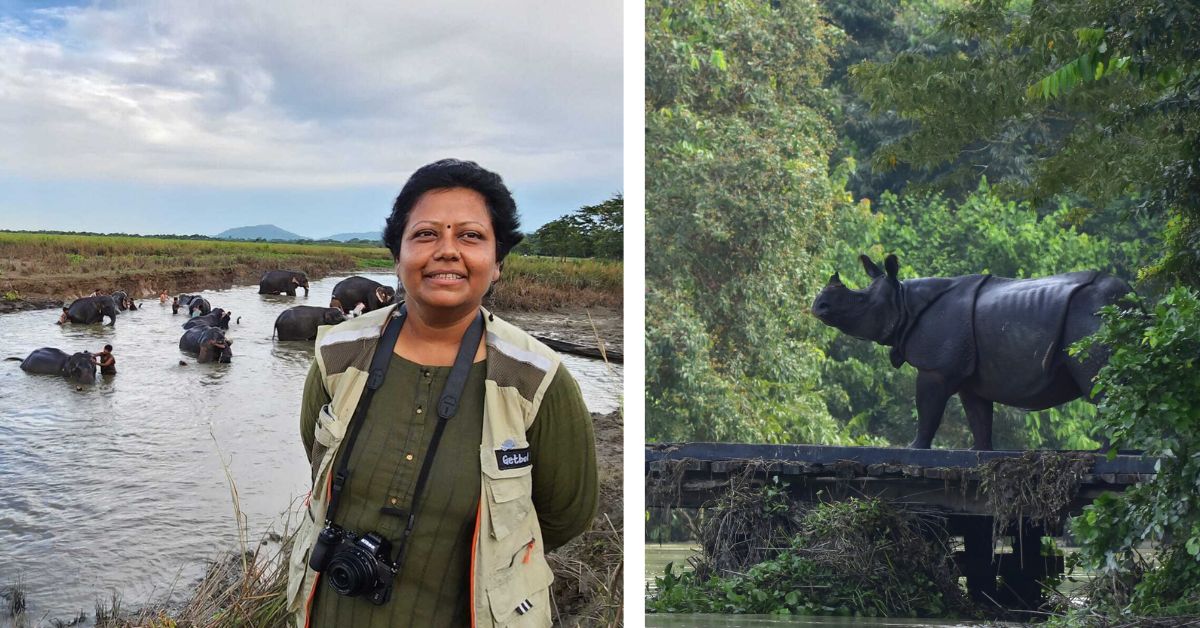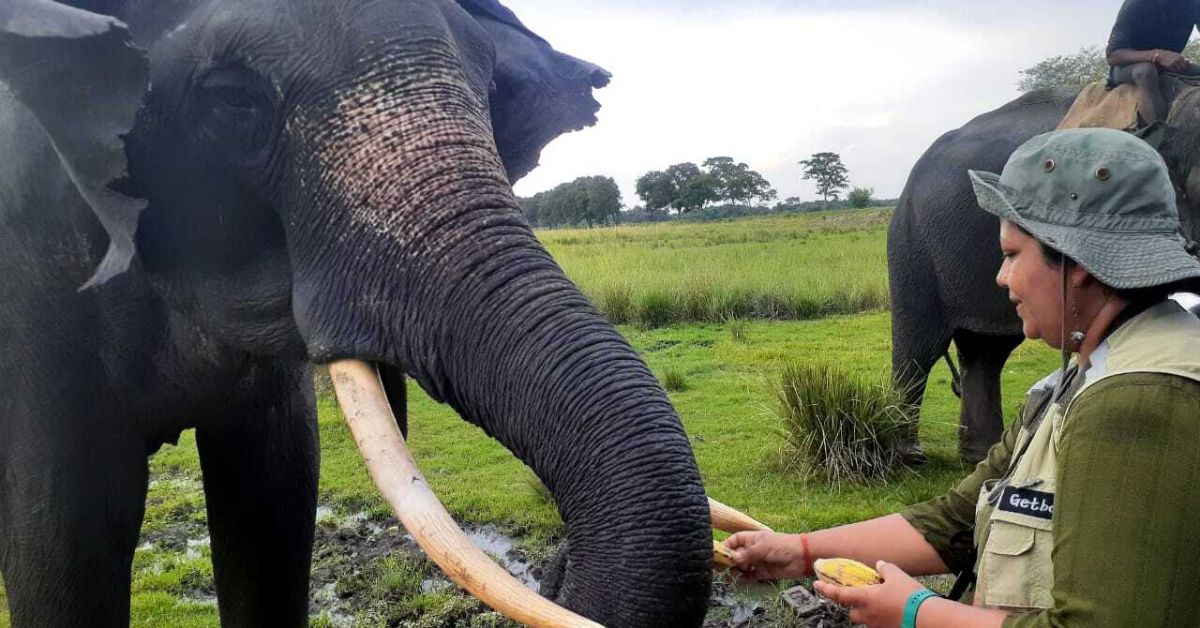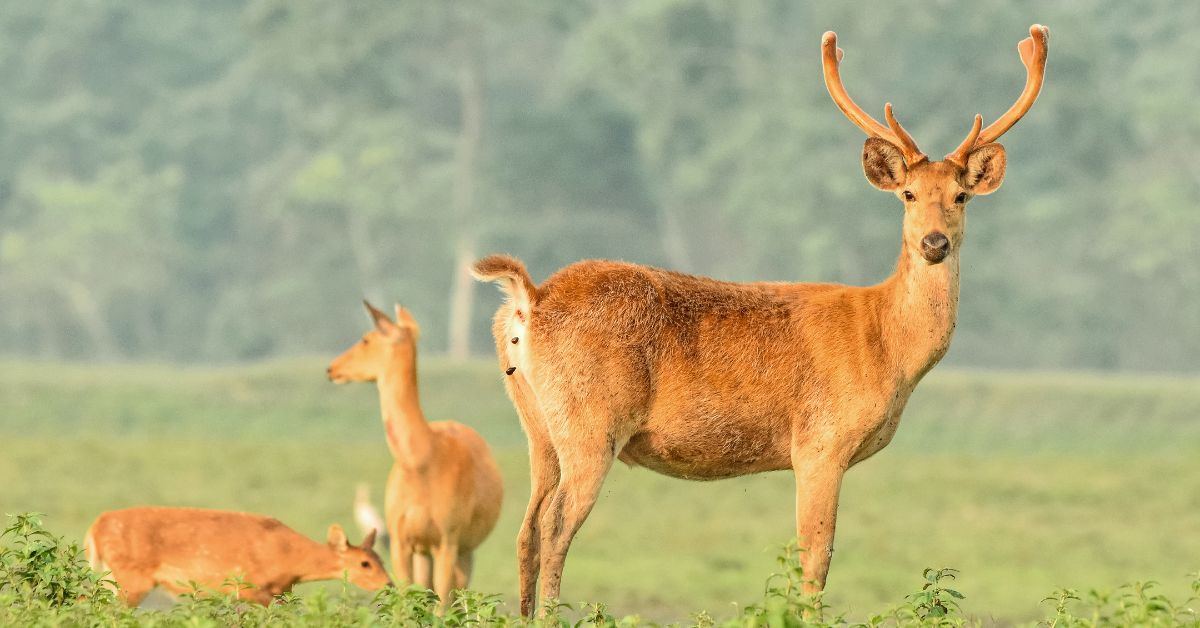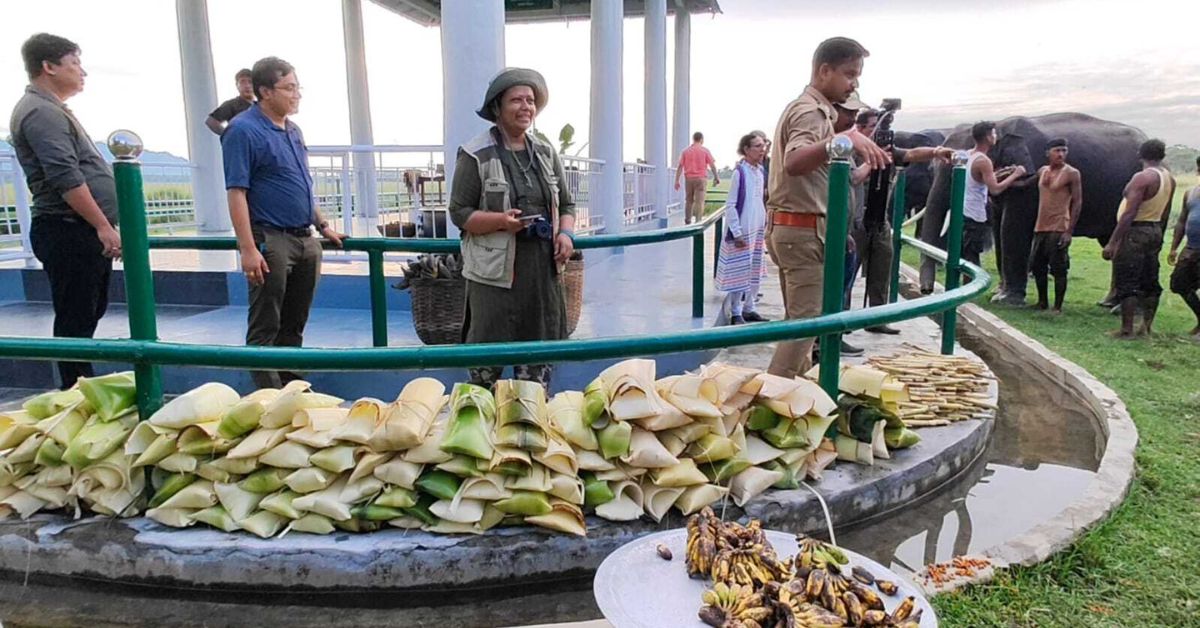“Sadly, the perception that women can’t devote equal time to their workplace as men still persists,” says Sonali Ghosh, the newly-appointed field director of Kaziranga National Park on 1 September 2023. She shared this sentiment upon being congratulated for her new post.
While the glass ceiling may show signs of wear and tear, it undeniably persists. For Sonali, who proudly assumes the title as the first woman in this role, it represents not only a personal achievement but also a path paved for future generations of women.
Since taking on her role brimming with responsibilities, Sonali Ghosh has been filled with joy while working in nature’s paradise.
In an exclusive conversation with The Better India, she takes us on a journey through her experiences, sharing both her challenges and offering a glimpse into a day in the life of Kaziranga National Park’s field director.
Finding her calling in nature
Born in Pune in 1975, Sonali had a childhood that consisted of travelling and moving cities.
“I was born in a middle-class Bengali probashi (non-resident) family. My father’s army background allowed us to move constantly. While it might sound hectic, I had the opportunity to meet new people and know their culture,” she reflects.
“I also spent a lot of time in nature which allowed me to have a connection with it,” she says.
Calling herself a “late bloomer”, Sonali notes that she had a passion for Biology when she was a young student. She took life sciences as her specialisation during graduation.

“The turning point in my life came when I secured a scholarship to take up a master’s course in wildlife science at the Wildlife Institute of India in Dehradun. This was a unique course with a limited intake of 10 students once every two years,” she recollects.
The curriculum is very hands-on and allows students to observe animals at a close range in the country’s best Protected Areas such as Manas, Kaziranga etc.
“This, combined with teaching and active discussions with the country’s top wildlife scientists and researchers at the institute, helped nurture a sense of dedication and pursuit of excellence that has fortunately stayed on,” she notes.
While Sonali had always harboured a fondness for nature, animals, and animal science, it was her probationary training at Kaziranga that ignited her initial interest into an unbridled passion.
“It was almost two decades ago when I started at Kaziranga and I could not be thankful enough for the opportunity,” she says.
‘Had to put work above everything for a while’
While Sonali comes from a progressive and supportive family, she recalls that it was the society’s mindset that tried to be a hurdle in her life.
“In those days, the ideal woman was expected to pursue a good education, perhaps find employment, but most crucially, prioritise marriage,” she says.

Looking back on the situation then, she continues, “I can’t express enough gratitude for my parents’ unwavering support of my dreams. However, upon reflection, it becomes evident that it was societal norms that once impeded the progress of women like me. With my father’s efforts, I never let the societal pressure win.”
On similar lines, Sonali also recalled how being a woman in a highly male-dominated profession played out for her.
“In terms of mental well-being, workplaces in Assam and North Easter India are far better than the rest of the country. Women are free to dress, talk and behave in any manner they wish,” she says.
However, since the job was male-dominated, the workplace often lacked hygiene requirements for a woman worker.
“Living comfortably was very hard to come by back in those days. There was always a lack of hygiene, However, things have become much better with more women joining the workforce,” she says.
How she fared as the only woman
Talking about gender discrimination in the field, Ghosh recalls a time when she worked as a young ACF (Assistant Conservator of Forest) and was the only woman in the field.
“People around me would take some time to digest that a woman was in command. I would often hear gossip and chattering behind my back, but I never let it bother me. The one advice to all women out there in such a setting would be to develop a Rhino-like thick skin,” she says.
“In general, the mindset of male bosses or colleagues is that women are meant for ‘softer’ jobs. They thought that women could not or should not put in extra hours as they would need to tend to children and families. As a result, we have had to work extra hard to prove ourselves. But our assertiveness or proactive behaviour is often misconstrued as aggression,” she adds.

However, Sonali says, she did not care about opinions and continued to focus on her work, keeping her work above everything else.
Mother to a young girl, she often had to spend months without her child away from home. “In such cases, a strong family relationship is essential,” she says. “The workload could be such that I would end up neglecting even my health in many instances,” she says, adding that her husband and family always came to her rescue.
Being chased by rhinos to climbing trees
Besides being the field director at Kaziranga, she has held several other titles.
“I was a DFO (Divisional Forest Officer) at Kokrajhar where I managed a sanctuary and a highly endemic primate species — the Golden Langur or Sonali Bandor. My namesake and I have since then shared a special bond,” she recalls lovingly.
Recalling one of her favourite workplaces, she says, “I am fortunate to have served at Manas National Park with its sheer natural beauty and unique conservation and governance models. It taught me that there are many sides to a coin and one must appreciate history to become an effective administrator.”
Sonali also served a tenure as the director of the National Zoo in Delhi before she accepted the role at Kaziranga.
Calling Kaziranga her Karma Bhoomi (land of action), she fondly recalls, “I started my career in the state at Kaziranga as a probationary trainee. At that time I was 20 years younger and 20 kg lighter! So when a rhino chased me, I was able to find the courage and strength to climb a tree! I dread what will happen now.”
Ghosh’s newfound responsibilities encompass a range of vital tasks, from patrolling and surveillance to thwart poachers, to coming to the aid of wild animals in distress. She also engages with local communities, delving into their reliance on the forest and exploring avenues for sustainable livelihoods.

Furthermore, the role demands precise monitoring of wildlife through scientific techniques and the careful management of tourism through the creation and execution of ecotourism initiatives.
Describing her work, she says, “First and foremost, I need to be an effective listener and understand how this famed protected area works. I have a great team with one of the finest forest frontline-to-area ratios in the country.”
“My first priority would be to continue with its protection, ensure and strengthen Rhinoceros and other flagship species’ conservation. The second priority would be the utmost welfare of the forest frontline staff who serve 24×7 in one of the toughest conditions at Kaziranga,” she adds.
Although it has only been 20 days since Sonali assumed the new responsibility, she is quite geared up for the upcoming workload.
“It is a great responsibility and I am thankful to the state government for giving me the opportunity. I can’t wait to give my best to nature and conserve the wildlife of the national park,” she says.
Referring to women aspiring to be in the field of forest and wildlife conservation in India, she says, “Women and young ladies who love outdoors and want to make a difference, be the voice of the most vulnerable communities must drop all their apprehensions and give it a try. There are several opportunities to explore and the sky’s the limit!”
Edited by Padmashree Pande
No comments:
Post a Comment